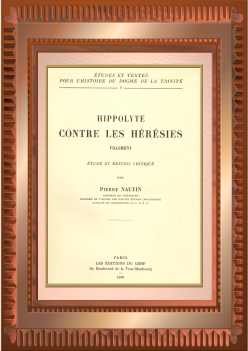Prosopon: the Father and the Son
The Bible uses the word 'person,' the Greek 'prosopon', both of the Son, and also of the Father.
The Bible talks about the "person" of Christ: "To whom ye forgive any
thing, I forgive also: for if I forgave any thing, to whom I forgave it, for your sakes forgave I it
in the person ['prosopon'] of Christ..."
(2 Corinthians 2:10 KJV).
'Prosopon' is also used of the Father:
"And said to the mountains and rocks, Fall on us, and hide us
from the face ['prosopon'] of him that sitteth on the
throne, and from the wrath of the Lamb..." (Revelation 6:16);
"Take heed that ye despise not one of these little ones; for I say
unto you, tthat in heaven their angels do always behold the face ['prosopon'] of my Father which is in
heaven." (Matthew 18:10);
"Repent therefore and be converted, that your sins may be blotted out, so that times of refreshing
may come from the presence ['prosopon'] of the Lord, and that He may send Jesus Christ, who was preached
to you before..." (Acts 3:19-20).
"For Christ has not entered the holy places made with hands, which are
copies of the true, but into heaven itself, now to
appear in the presence ['prosopon'] of God for us..."
(Hebrews 9:24).
...and also of the Son:
"These shall be punished with everlasting destruction from the presence ['prosopon'] of the Lord
and from the glory of His power, when He comes, in that Day, to be glorified in His saints and to be admired among all those
who believe, because our testimony among you was believed."
(2 Thessalonians 1:9-10).
"And he said, My presence ['prosopon'] shall go with thee,
and I will give thee rest." (Exodus 33:14).
So Bible readers who speak of 'the person of the Son' and 'the person of the Father' are not departing from Biblical usage.

Prosopon: The Holy Spirit
Parallelism, the repetition of the same thought, differently expressed,
in sequence, is of common occurrence in the Old Testament. If these are
instances of equivalent parallelism, then 'prosopon' is also used of the Holy Spirit:
"Cast me not away from thy presence ['prosopon' LXX]; and remove not thy holy Spirit from me."
(Psalm 51:11).
"Whither shall I go from thy Spirit? and whither shall I flee from thy presence ['prosopon' LXX)?"
(Psalm 139:7).
A similar Hebrew word, paniym, occurs in Ezekiel 39:29: "Neither will I hide my face ['paniym'] any
more from them: for I have poured out my spirit upon the house of Israel, saith the Lord GOD."

Express Image
"God, who at various times and in various ways spoke in time past to the fathers
by the prophets, has in these last days spoken to us by His Son, whom He has appointed heir of all
things, through whom also He made the worlds; who being the brightness of His glory and the express
image of His person ['hypostasis'], and upholding all things by the word of His power, when He had by
Himself purged our sins, sat down at the right hand of the Majesty on high..." (Hebrews 1:3).
In the half century after Nicaea, the catch-phrase "One substance ['ousia'] in
three subsistences ['hypostases']" came into favor amongst Greek theologians. T. F. Torrance credits
Didymus of Alexandria [c. 310 - 395 A.D.] with this formula: "He [Didymus
of Alexandria] may well have been the first theologian to have used the
formula, 'mia ousia, treis hypostaseis' [one substance, three hypostases]..."
(The Trinitarian Faith, p.
323). The term itself had been used before: "Origen in turn
writes: 'We have learned to believe in three hypostases, the Father and
the Son and the Holy Ghost."" (In Joan, XIV, 28., Abbe Felix
Klein, The Doctrine of the Trinity, p. 89). Like 'prosopon', this word is also Biblical, occurring in Hebrews 1:3.
Though often used as if functionally equivalent to 'person,' it does
not carry any connotation of personhood or consciousness, rather 'instantiation:' i.e., the 'ousia' of 'humanity'
is expressed in the hypostases Tom, Dick, Jane, etc.
The "brightness" and "express image" of Hebrews 1:3 delineate a relation between "God" (the Father)
of verse 1 and "His Son". An "express image" is numerically distinct from its original, though
differing in no particular feature. Much as 'Oneness' Pentecostals fondly hope to nudge these
relations toward the incarnation, making 'the flesh' the express image of 'the Spirit' (however
that may be done), the Bible's "through whom also He made the worlds" closes that door, making it
plain the "Son" under discussion is the eternal Son, present at the Day of Creation.
The 'God' of Hebrews 1:1 is God the Father, as we know from His being placed in relation to "His
Son." 'Theos' [God] and 'kyrios' [Lord], wedded together in
the Septuagint (Greek Old Testament) as the two common titles of
the living God, find themselves neatly sorted out in the New Testament, dispensed respectively to
Father and Son: "For even if there are so-called gods, whether in heaven or on earth (as there are
many gods and many lords), yet for us there is one God, the Father, of whom are all things,
and we for Him; and one Lord Jesus Christ, through whom are all things, and through whom
we live." (1 Corinthians 8:5-6). To those unfamiliar with this New Testament usage, the
Jehovah's Witnesses and the 'Oneness' Pentecostals plug 'Father-onlyism' as the Bible way. Yet
one might with equal justice base 'Son-onlyism' on Hebrews 1:8, where it is "the Son"
called "God": "But to the Son He says: 'Your throne, O God, is forever and ever...'",
or 'Holy Spirit-onlyism' on Acts 5:4, where it is the Holy Spirit called "God": "...You
have not lied to men but to God." Common sense dictates that, where "God" is placed
in relation to another who is known to be God, like "His Son", "God" is understood specifically of Him
who bears that relation: in this case, God the Father.
The understanding of the Greek theologians that there is more than one
'hypostasis' in God may have arisen through close study of Hebrews 1:3.
An 'exact imprint' is numerically distinct, though substantively identical,
to its exemplar:
"The apostle, calling the Son of God 'the stamp of the Father's hypostasis'
[Heb. 1:3], doubtless assigns some subsistence to the Father wherein he
differs from the Son. For to consider hypostasis equivalent to essence...would be not only
uncouth but also absurd. For since the essence of God is simple and undivided, and he
contains all in himself, without portion or derivation, but in integral perfection, the Son
will be improperly, even foolishly, called his 'stamp.' But because the Father, although distinct
in his proper nature, expresses himself wholly in the Son, for a very good reason it is said that he
has made his hypostasis visible in the latter. In close agreement with this are the words
immediately following, that the Son is 'the splendor of his glory'. Surely we infer from
the apostle's words that the very hypostasis that shines forth in the Son is in the Father.
From this we also easily ascertain the Son's hypostasis, which distinguishes him from the
Father...Indeed, this is not a distinction of essence, which it is unlawful to make manifold.
Therefore, if the testimony of the apostle obtains any credence, it follows that there are in
God three hypostases." (John Calvin, Institutes of the Christian Religion, Book I, Chapter XIII, 2).
This use of 'hypostasis' by Greek theologians provoked controversy in the West. The Greeks diagnosed the problem
as the "poverty" of the Latin language: "We use in an orthodox sense the terms one Essence and three Hypostases,
the one to denote the nature of the Godhead, the other the properties of the Three; the Italians mean the same, but, owing to the
scantiness of their vocabulary, and its poverty of terms, they are unable to distinguish between Essence and Hypostases, and
therefore introduce the term Persons, to avoid being understood to assert three Essences. The result, were it not piteous,
would be laughable. This slight difference of sound was taken to indicate a difference of faith."
(Gregory Nazianzen,
Oration 21:35). The 'poverty' problem was this: the Latin 'substance' shares an etymology with 'hypostasis',
literally 'standing under,' and is consequently an attractive choice for the translator. Except 'substance' had already been
spoken for: it was the common rendering of 'ousia', which means 'being' or 'essence'. But all acknowledged that
three 'ousia's' was tritheism. The solution can run in either of two directions: either kick 'ousia' upstairs,
translating with a form of 'esse' ['to be'] (as 'ousia' is a form of 'einai', 'to be'), namely 'essence',
reserving 'substance' to correspond with 'hypostasis'; or else leave 'substance' to correspond to 'ousia',
translating 'hypostasis' as 'subsistence.' The contention over terms rose to this degree: "...there was a danger of
the whole world being torn asunder in the strife about syllables."
(Ibid.)

To Each His Own
How did 'hypostasis,' which means 'subsistence' or 'instantiation,' come to be treated as functionally equivalent
to 'person'? Those Greek theologians who preferred 'hypostasis' to 'person' were liberal-minded enough to grant to
each his own: "...thus we are regenerated, acknowledging the Unity in the Essence and in the undivided worship, and the
Trinity in the Hypostases or Persons (which term some prefer.) And let not those who are contentious on these points utter
their scandalous taunts, as if our faith depended on terms and not on realities. For what do you mean who assert the three
Hypostases? Do you imply three Essences by the term? I am assured that you would loudly shout against those who do
so. For you teach that the Essence of the Three is One and the same. What do you mean, who assert the Three
Persons? Do you imagine a single compound sort of being, with three faces, or of an entirely human form? Perish
the thought! You too will loudly reply that he who thinks thus, will never see the face of God, whatever it may be."
(Gregory Nazianzen, Oration 42, 16.) Though 'hypostasis' does not mean 'person,' those who preferred to say 'hypostasis'
said it at the same time as those who preferred to say 'person;' to each his own.

Men and Angels
Pet-food commercials employ 'person' as roughly equivalent to 'human being,'
but the same cannot be said of 'prosopon.' Angels too have 'faces':
"And all that sat in the council, looking stedfastly on him, saw his
face ['prosopon'] as it had been the face ['prosopon'] of an angel."
(Acts 6:15 ).
And I saw another mighty angel come down from heaven, clothed with a cloud: and a rainbow was upon his head, and his
face ['prosopon'] was as it were the sun, and his feet as pillars of fire:..."
(Revelation 10:1 ).
Even the theophanic 'Angel of the Lord,' who is God Himself, has a 'face':
"And when Gideon perceived that he was an angel of the LORD, Gideon said, Alas, O Lord GOD! for because I have
seen an angel of the LORD face to face ['prosopon pros prosopon' LXX]."
(Judges 6:22 ).
This angel, i.e. messenger, though called an angel, is no creature but God Himself:
"First and foremost, assurance is given them of the
personal presence of Jehovah in that ANGEL, in Whom is the Name of
the Lord (Exo. 23: 20). This was no common angel, however exalted,
but a manifestation of Jehovah Himself, prefigurative of, and
preparatory to His manifestation in the flesh in the Person of our
Lord and Savior Jesus Christ. For all that is here said of Him is
attributed to the Lord Himself in Exo. 13: 21; while in Exo. 33:
14-15, He is expressly designated as "the Face" of Jehovah (" My
Face" - in the Authorized Version "My presence")."
(Edersheim, Alfred (2014-06-29). Bible History: Old Testament: Books One Through
Four (The Works of Alfred Edersheim Book 4) (Kindle Locations
5141-5145). www.DelmarvaPublications.com.)
|


